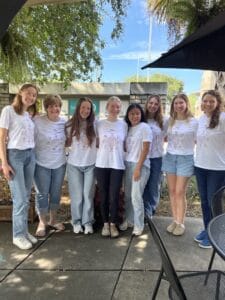This summer, Florida State University’s School of Communication and Science Disorders (SCSD) hosted its inaugural six-week Intensive Comprehensive Aphasia Program (ICAP). The program, designed by Dr. Elizabeth Madden and Faculty Clinical Supervisor Ellen Nimmons, focuses on utilizing a new clinical service delivery model to better the communication skills of those with aphasia.
“This past summer, we’ve been getting everything together to run this pilot project,” said Nimmons. “It has been really, really exciting and very invigorating.”
 Aphasia, an acquired language disorder due to brain injury or stroke, affects a person’s ability to speak, understand, read, and write, making ongoing therapy often necessary to regain these skills.
Aphasia, an acquired language disorder due to brain injury or stroke, affects a person’s ability to speak, understand, read, and write, making ongoing therapy often necessary to regain these skills.
“To really help people recover communication best after stroke, it needs to be done in this very intensive format,” Madden said. The six-week program provided speech and language assessments before and after the program and included four weeks of individual and group therapy at the FSU Speech & Hearing Clinic. Different types of evidence-based aphasia therapy were provided by supervised graduate student clinicians. Additionally, music therapy, art therapy, yoga therapy, and pet therapy was provided by related health professionals at FSU or TMH. Analysis of post-ICAP interview responses are being analyzed by SCSD Assistant Professor Erin Bush to understand participants’ perspectives and gain valuable insight for future iterations of ICAP.
“ICAP doesn’t just focus on the person’s ability to talk and read and write,” said Madden. “Part of the comprehensive component of this program is working on psychosocial well-being…that social connection.” Through their backgrounds as speech-language pathologists, both Madden and Nimmons have worked extensively with individuals who have aphasia and hope that ICAP will increase aphasia awareness and expand interprofessional care for individuals living with aphasia.
pathologists, both Madden and Nimmons have worked extensively with individuals who have aphasia and hope that ICAP will increase aphasia awareness and expand interprofessional care for individuals living with aphasia.
“We can say that on post-testing, all of our participants had changes. Positive changes,” said Nimmons.
The ICAP program is intended to become a yearly event. Through further collaborations with FSU faculty and staff members, such as this year’s collaboration with Suzanne Smith at FSU’s Opening Minds Through Art, and other aphasia intensives at different universities, the network will continue to grow as different professionals join, making ICAP a hub for supporting stroke survivors with aphasia and their family members in the greater Tallahassee community, as well as providing unique clinical training for FSU students.
Learn more about Opening Minds Through Arts on their website! https://claudepeppercenter.fsu.edu/opening-minds-through-art/

